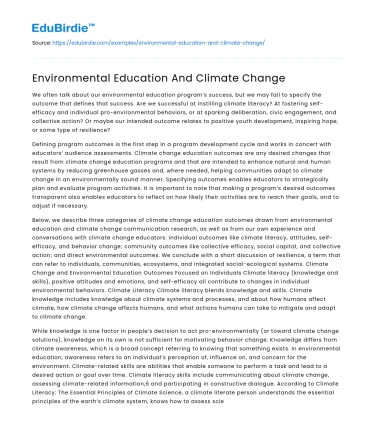We often talk about our environmental education program’s success, but we may fail to specify the outcome that defines that success. Are we successful at instilling climate literacy? At fostering self-efficacy and individual pro-environmental behaviors, or at sparking deliberation, civic engagement, and collective action? Or maybe our intended outcome relates to positive youth development, inspiring hope, or some type of resilience?
Defining program outcomes is the first step in a program development cycle and works in concert with educators’ audience assessments. Climate change education outcomes are any desired changes that result from climate change education programs and that are intended to enhance natural and human systems by reducing greenhouse gasses and, where needed, helping communities adapt to climate change in an environmentally sound manner. Specifying outcomes enables educators to strategically plan and evaluate program activities. It is important to note that making a program’s desired outcomes transparent also enables educators to reflect on how likely their activities are to reach their goals, and to adjust if necessary.
Save your time!
We can take care of your essay
- Proper editing and formatting
- Free revision, title page, and bibliography
- Flexible prices and money-back guarantee
Below, we describe three categories of climate change education outcomes drawn from environmental education and climate change communication research, as well as from our own experience and conversations with climate change educators: individual outcomes like climate literacy, attitudes, self-efficacy, and behavior change; community outcomes like collective efficacy, social capital, and collective action; and direct environmental outcomes. We conclude with a short discussion of resilience, a term that can refer to individuals, communities, ecosystems, and integrated social-ecological systems. Climate Change and Environmental Education Outcomes Focused on Individuals Climate literacy (knowledge and skills), positive attitudes and emotions, and self-efficacy all contribute to changes in individual environmental behaviors. Climate Literacy Climate literacy blends knowledge and skills. Climate knowledge includes knowledge about climate systems and processes, and about how humans affect climate, how climate change affects humans, and what actions humans can take to mitigate and adapt to climate change.
While knowledge is one factor in people’s decision to act pro-environmentally (or toward climate change solutions), knowledge on its own is not sufficient for motivating behavior change. Knowledge differs from climate awareness, which is a broad concept referring to knowing that something exists. In environmental education, awareness refers to an individual’s perception of, influence on, and concern for the environment. Climate-related skills are abilities that enable someone to perform a task and lead to a desired action or goal over time. Climate literacy skills include communicating about climate change, assessing climate-related information,6 and participating in constructive dialogue. According to Climate Literacy: The Essential Principles of Climate Science, a climate literate person understands the essential principles of the earth’s climate system, knows how to assess scientifically credible information about climate communicates about climate and climate change in a meaningful way, and is able to make informed and responsible decisions with regard to actions that may affect climate. The National Academy of Sciences also includes behavior change under the umbrella of climate literacy. Environmental literacy is broader than climate literacy. Environmental literacy is defined as the ability to make informed decisions concerning the environment; being willing to act on these decisions to improve the well-being of other individuals, societies, and the global environment; and participating in civic life. Attitudes and Emotions Attitudes and emotions are included in definitions of environmental literacy but are generally left out of definitions of climate literacy. However, understanding attitudes and emotions is critical to designing climate education programs. Attitudes are cognitive representations of how people evaluate an action, event, idea, or thing.
The building blocks for attitudes include values, beliefs, and emotions. Many environmental education programs operate with the goal of promoting positive attitudes toward the environment, although research shows that attitudes are very hard to change. A large body of climate change communication research focuses on understanding public attitudes toward climate change and on experimenting with the ways in which communication affects attitudes. This research can help environmental educators target their message while avoiding trying to directly change attitudes.






 Stuck on your essay?
Stuck on your essay?

